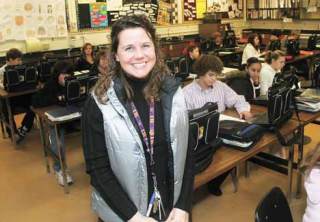Getting through to seventh-graders is not easy, especially for a teacher.
But every day in Room 29 at Mattson Middle School, Andrea Hemphill is doing everything she can to reach the rows of sometimes-surly 12-year-olds who file in for their daily science lessons.
And Hemphill seems to be getting through, using a high-energy approach and a simple philosophy: “You gotta make it fun.”
“It has to be fun and exciting for them.” Hemphill said. “Period.”
In today’s day and age of fast edits, multimedia and multitasking, Hemphill says the secret to her success involves making sure she tries to do two things in each class: to grab the kids’ attention and to hook them into the lesson.
“You just give them a variety,” she said. “Whatever you can do to capture (their attention), that’s their reasoning to do other activities.”
Whatever she’s doing, it must be working.
Hemphill, 32, was recently named the 2008 Washington Middle School Science Teacher of the Year by the Washington Science Teachers Association.
Hemphill said the award is a nice recognition, but she is just doing her job.
“Any teacher you talk to is doing their best,” she said. “It feels a little weird to be singled out.”
Hemphill has been at Mattson for nine years, the first as a student teacher and the rest in her own classroom. Principal Steve Beck said in that time, she has become a leader in the building and a favorite among students.
It’s one of the reasons he nominated her for the award.
“She has been a leader ever since she came into the building,” Beck said. “But all that pales in comparison to the passion she has for teaching kids.”
Hemphill, originally from Auburn, said her passions for science were stirred by her Advanced Placement biology teacher at Auburn High School, Clare Nance, who made science fun for her.
“She gets a lot of credit,” Hemphill said of Nance, who still teaches at Auburn Mountainview High School.
“She was just a really dynamic teacher. We did lots of hands-on things.”
Hemphill carries on the “hands-on” tradition, trying to engage the kids the same way her favorite teacher engaged her.
“We make it as hands-on as possible,” she said of her classes. “I think they respond to that.”
Hemphill said Nance inspired her to study biology – “My first love” – at the University of Washington, but academic research bored her and the thought of getting into a classroom was always there.
“I think I knew from an early age I liked teaching,” she said. “I’m more of a people person. I like dealing with kids.”
Hemphill’s love of science is obvious and she even relates it to her own life, talking about how every day she uses the scientific method – the idea of creating and testing a hypothesis and then revising that hypothesis based on the experiment’s results – to evaluate what works in her class and what does not.
She also was forced to take a hard look at her teaching style while earning her national Board Certification, which requires analysis of videotaped lessons.
She urges all teachers to be self-reflective about what they do to help find new ways to reach kids they might not be reaching.
“If it doesn’t work, don’t do it. Change it,” she explained.
Hemphill said she’s also learned that if she can find a way to tell a personal story and connect science to real life, the better.
“As a teacher, I think the more firsthand knowledge you have of the things you’re teaching, the better for the kids,” she said.
For example, on a recent vacation with her fiance – also a teacher, though not science – Hemphill brought back a fossil of two flies trapped in amber that she passed around to show the class.
For students like Terence Grady, 12, that makes all the difference.
“Every subject we learn she makes more fun,” he said, citing the fossils specifically.
“I really like this class because instead of just trying to teach us boring stuff, she makes it fun.”
Lauren Hackett, 12, agreed, adding that compared to some of her other classes, Hemphill’s is more engaging and interesting.
“She’s probably my favorite teacher,” Hackett said. “She works with us through a lot of things instead of telling us what to do.”
Hemphill said she draws a lot of energy and inspiration from the kids, whose first question is always “What are we going to do today?” (Well, it’s either that or “Can we blow things up?”)
Beck describes her room as a place where “science comes alive, you’re not reading from a book.”
“It’s neat when a people who deserve it get recognized,” Beck said.
Along with the honor of the award, Hemphill will receive a certificate and a $500 honorarium.
She also was honored recently at a regional dinner with other award-winning science teachers from Washington and Oregon.
But while the award is nice reminder that she is doing things right, Hemphill said she will continue teaching every day because she enjoys the challenge and the work of trying to reach students.
“I see myself staying in the classroom a while longer,” she said. “I just enjoy the kids a lot.
“Ultimately, I feel like I am doing what I’m meant to be doing.”
Talk to us
Please share your story tips by emailing editor@kentreporter.com.
To share your opinion for publication, submit a letter through our website https://www.kentreporter.com/submit-letter/. Include your name, address and daytime phone number. (We’ll only publish your name and hometown.) Please keep letters to 300 words or less.

